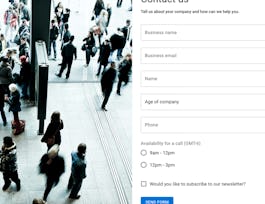In this course, “Questions, Present Progressive and Future Tenses,” you will learn about question words in English and how to form questions in the simple present. Then you will learn how to form the present progressive to express ideas about things that are happening right now. You will look at the differences between the simple present and present progressive. Finally, you will learn how to use “to be going to” and the present progressive to talk about the future and how to use “can” to talk about ability.


Questions, Present Progressive and Future Tenses
This course is part of Learn English: Beginning Grammar Specialization
Taught in English
Some content may not be translated


Instructors: Rachel Fernandez
32,016 already enrolled
Included with 
Course
(766 reviews)
99%
Details to know

Add to your LinkedIn profile
4 quizzes
Course
(766 reviews)
99%
See how employees at top companies are mastering in-demand skills

Build your subject-matter expertise
- Learn new concepts from industry experts
- Gain a foundational understanding of a subject or tool
- Develop job-relevant skills with hands-on projects
- Earn a shareable career certificate


Earn a career certificate
Add this credential to your LinkedIn profile, resume, or CV
Share it on social media and in your performance review

There are 4 modules in this course
We will start this week with question words. You will learn how to ask information questions in the simple present. Information questions are questions where the answer is not "yes" or "no." The answer is some information. For example, “Where are you?” is an information question because the answer is not “yes.” It is, “I’m at school.”
What's included
4 videos3 readings1 quiz
This week, you will learn more about nouns: count nouns and non-count nouns. This will help you ask questions like “How many brothers do you have?” and “How much time do you need?” Then we will look at the present progressive. This is another verb tense in English. The present progressive tells about things that are happening now. You will learn about how to form it and also how to make the negative.
What's included
3 videos3 readings1 quiz
This week is all about asking questions with the present progressive. You will learn how to ask yes/no questions and information questions. Then we will compare simple present and present progressive so you can see when to use each. You will learn about signal words and the difference between sentences like “I speak English” and “I am speaking English.”
What's included
3 videos3 readings1 quiz
Now that you know how to form the present progressive, this week you will see how we use “be going to” and the present progressive to talk about the future. You will also learn how to use “can” to talk about what you can and can’t do.
What's included
3 videos3 readings1 quiz
Instructors

Offered by
Recommended if you're interested in Learning English

University of California, Irvine

Coursera Project Network

Coursera Project Network

University of California, Irvine
Why people choose Coursera for their career




Learner reviews
Showing 3 of 766
766 reviews
- 5 stars
90.18%
- 4 stars
7.62%
- 3 stars
1.67%
- 2 stars
0.12%
- 1 star
0.38%

Open new doors with Coursera Plus
Unlimited access to 7,000+ world-class courses, hands-on projects, and job-ready certificate programs - all included in your subscription
Advance your career with an online degree
Earn a degree from world-class universities - 100% online
Join over 3,400 global companies that choose Coursera for Business
Upskill your employees to excel in the digital economy
Frequently asked questions
Access to lectures and assignments depends on your type of enrollment. If you take a course in audit mode, you will be able to see most course materials for free. To access graded assignments and to earn a Certificate, you will need to purchase the Certificate experience, during or after your audit. If you don't see the audit option:
The course may not offer an audit option. You can try a Free Trial instead, or apply for Financial Aid.
The course may offer 'Full Course, No Certificate' instead. This option lets you see all course materials, submit required assessments, and get a final grade. This also means that you will not be able to purchase a Certificate experience.
When you enroll in the course, you get access to all of the courses in the Specialization, and you earn a certificate when you complete the work. Your electronic Certificate will be added to your Accomplishments page - from there, you can print your Certificate or add it to your LinkedIn profile. If you only want to read and view the course content, you can audit the course for free.
If you subscribed, you get a 7-day free trial during which you can cancel at no penalty. After that, we don’t give refunds, but you can cancel your subscription at any time. See our full refund policy.

